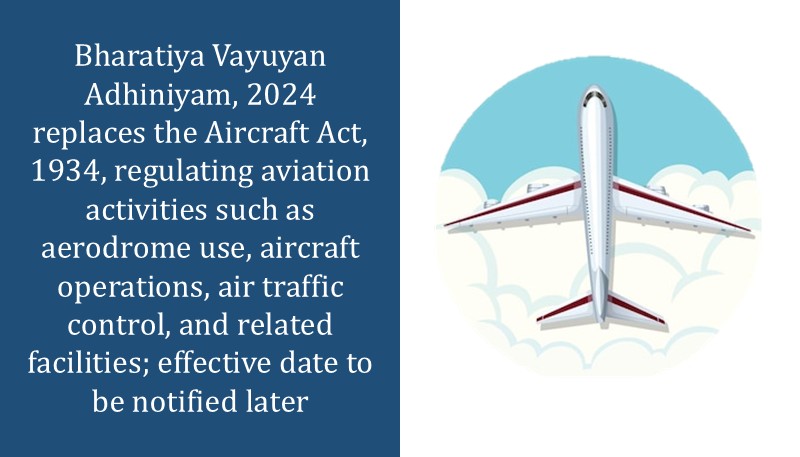Bharatiya Vayuyan Adhiniyam, 2024 replaces the Aircraft Act, 1934, regulating aviation activities such as aerodrome use, aircraft operations, air traffic control, and related facilities; effective date to be notified later

The Bharatiya Vayuyan Adhiniyam, 2024 (“Act”) has received the assent of the President of India. The Act seeks to repeal the Aircraft Act, 1934, while largely retaining its key provisions.
The Act regulates the person or persons using any aerodrome or engaged in the aircraft operations, air traffic control, maintenance and operation of aerodrome, communication, navigation, surveillance and air traffic management facilities and more.
Please note that the Centre is expected to follow this up with separate commencement notifications through the Official Gazette and appoint different dates to give effect to different provisions of the Act.
Key Highlights:
- The process for testing and issuing Radio Telephone Operator Restricted Certificates and licenses, previously conducted by the Department of Telecommunications (DoT) for aviation personnel (including aircraft maintenance engineers, flight dispatchers, and pilots), has now been moved to the Directorate General of Civil Aviation (DGCA)..
- The Act established three key authorities:
- DGCA for performing regulatory functions and safety oversight
- BCAS for overseeing security
- AAIB for investigation of aircraft accidents
The Central Government retains overall superintendence over these bodies and may issue directives and review their orders. Appeals against the decisions of DGCA or BCAS will be made directly to the Central Government, and no further appeal is permitted.
- The Act delineates several offences and associated penalties, including violations related to dangerous goods, animal slaughter near aerodromes, or general breaches of rules/directions under the Act. Those found guilty of abetting or attempting any offence under this Act will be subject penalties equivalent to the main offence. Further, repeat offences committed within five years are not eligible for compounding.
Source: Ministry of Law and Justice